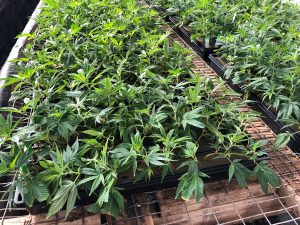
A new zero-THC hemp variety hitting the market this spring is thought to be the first commercially available cannabis variety that uses biotechnology to “silence” a cannabinoid.
The Pandora variety was created by a team of Texas A&M and private cannabis scientists over the past two years using RNA interface (RNAi) technology, which acts to silence the genetic pathway that produces THC in a hemp plant.
Developers say the cultivar produces 17% to 22% CBD but no THC.
It is the product of a research collaboration between Texas A&M University’s AgriLife Research and Growing Together Research Inc., an Indiana biotechnology firm focused on computational genomics and bioengineering of hemp.
Trilogene Seeds, based in Boulder, Colorado, will sell the variety as clones this spring in the United States, with seeds for the U.S. and international markets ready in the fall.
Solving hot hemp

Matt Haddad
Developing a THC-null cultivar can help farmers remain compliant with federal laws without the fear of having to destroy their crops and lose their investment, the company’s CEO Matt Haddad told Hemp Industry Daily.
In 2020, nearly one-tenth of the 70,530 hemp acres planted in the U.S. surpassed the 0.3% THC federal threshold and had to be destroyed, according to the 2021 Hemp & CBD Industry Factbook.
In addition to losing money and time on their crops, and putting them in danger of being criminally negligent, the risk of hemp crops going hot has impacted farmers’ ability to secure services such as lending, banking and insurance.
Producing a THC null trait also makes cannabinoid production in hemp more efficient, as the plant can focus on producing CBD instead of THC. This will allow hemp growers and processors to need less hemp biomass to produce the same amount of CBD, Haddad said.
Applying agricultural biotechnology to cannabis
Trilogene provided its hemp genetics to GTR for the project, Haddad told Hemp Industry Daily.
The research collaboration was experimental because it hasn’t been done in cannabis, though the technology has been used widely in other agricultural crops, Haddad said.
But using RNAi technology doesn’t mean it’s the same as genetically modified plants, in which genetic material has been manipulated by combining plant, animal, bacteria and virus genes to change the physiological structure of a plant.
The zero-THC cultivar is not physiologically different from other hemp varieties; it simply cannot express or produce THC, Haddad said.
“This naturally occurs, whether there’s breeding work done or not, you simply have to find those plants and find those phenotypes and test them, but this is a naturally occurring thing that happens with cannabis genetics,” he said.
“We just silenced a certain trait that we simply don’t want without affecting the physiology of the plant itself.”
Further, farmers producing other varieties won’t need to worry about rogue bioengineered pollen drifting to other crops, including hemp and marijuana, because the variety is cloned and all seed produced is fully feminized, Haddad said.
“This is also a variety we plan to triploid in seed form, so even if there was some sort of hermaphrodites in an outdoor crop … it would produce immature seed, but not usable seed that would make any contamination, very similar to seedless watermelon or seedless grapes.”
The U.S. Department of Agriculture and its Animal and Plant Health Inspection Service requires companies like Trilogene Seed to report and label products that are bioengineered through the SECURE Rule (Sustainable, Ecological, Consistent, Uniform, Responsible, Efficient), which is the first comprehensive revision to biotechnology regulations since they were established in 1987.
The rule enables USDA-APHIS to regulate organisms developed using genetic engineering and offers transparency about the way the crops are developed and produced.
“It’s certainly not something we want to hide from. We want people to understand it,” Haddad said.
“And at the end of the day, it comes down to labeling laws of what USDA and APHIS, and even FDA wants us to do. We’ve gone through pretty much all of those hurdles.”
More to come
In addition to Pandora, Trilogene Seed and its research partners are working on other THC null varieties that can produce cannabinoids, Haddad told Hemp Industry Daily.
“Our genetics are the starting stock of some of those projects, and so this is really the tip of the iceberg of what we can do with this technology,” he said.
“Any attributes in cannabis, whether that’s other minor cannabinoids, like CBD-V THC-V, while still keeping it, THC compliant or THC null, will absolutely be possible.”
Beyond that, Trilogene has provided more than 60 different varieties to Texas A&M and research partners to study hemp’s carbon sequestration capabilities. The research team is working to identify the genes within the plant to allow it to sequester more carbon, and produce more fiber and lignin and bast content to improve supply chain efficiencies, Haddad said.
“Really any attribute in cannabis, this can be applied to … so this is really the start of it.”
Laura Drotleff can be reached at [email protected]

